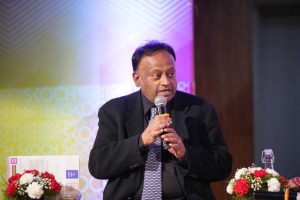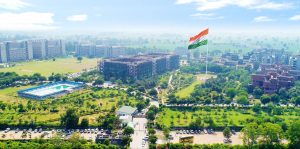In its annual report published few years back, UNESCO had declared, “The Social Sciences have a critical contribution to make, in helping us understand, imagine, and craft a more sustainable future for all.” Today, that future is here, and the need for sustainable considerations is greater than ever before. Social scientists can be the real superheroes we all need now. The B.A. (Hons.) Social Science and Policy programme, offered by Jindal School of Government and Public Policy (JSGP), can equip aspiring social scientists with the knowledge and skills to address the challenges we are facing as a global community.
“There is only one social science and we are all its practitioners,” observed the American economist George Stigler. In that sense, social science is a part of all of us, and forall of us. Yet the broad term “social science studies” is often shrouded in mystery. Interestingly, it is this broadness of subjects that has made the study of social science and policy an attractive proposition for those who want to positively impact society.
The B.A. (Hons.) Social Science and Policy programme at JSGP is a first-of-its-kind course of study meant for anyone who wants to play a meaningful role in public life. Social scientists have the power to solve global problems by learning from different cultures. The programme offered by JSGP seeks to harness this tremendous potential in young learners. As Professor R. Sudarshan, Dean, JSGP says, “Ultimately the goal is to make our students better human beings, cultivating in them empathy and understanding towards others, critical thinking, good communication skills, and a broad understanding of how societies have changed over time and can change for the better in future.” By challenging students to examine the world around them, the programme empowers the young learners to think of new ways to address existing problems.
According to the World Economic Forum, complex problem-solving is the number one skill needed to thrive in the Fourth Industrial Revolution. Trained to become problem-solvers, social scientists can examine issues ranging from climate change and gender inequality to deforestation and human rights violations. The Social Science and Policy programme, launched by one of the country’s top universities, is uniquely positioned to shape practitioners, scholars, and thinkers whose contributions can change lives around the world.
From a solid foundation in theoretical understanding to hands-on training that leads to practical insights, here are five ways in which the B.A. (Hons.) Social Science and Policy programme can nurture tomorrow’s change-makers.
Broad range of subjects helps develop the ability to think laterally
JSGP offers two types of undergraduate programmes. Students who want to specialize in economics and business can opt for the B.A. (Hons.) Economics programme. Professor Sudarshan recommends the B.A. (Hons.) Social Science and Policy programme for “those who are comfortable with different strategies for different problems and can live with contradictions.”
Study of the social sciences includes history, psychology, sociology, culture, geography, anthropology, archaeology, economics, communication, and political science. From sociological thought to public policy, and microeconomics to media and society, the programme covers a range of topics, themes, and ideas. The interdisciplinary approach to learning at O.P. Jindal Global University (JGU) provides a broad-based foundation for the programme and helps shape professionals who can solve a problem by looking at it in different ways.
Global perspective to understand diversity
Practically every industry with a strong online presence and impacted by digital disruptions both sustains and promotes globalization. It’s not just the customer base, but also the workforce that has become diverse. Organizations, big and small, in public and private sectors, are increasingly sensitive to diversity. Social science students are trained to have a deeper understanding of diversity – whether it is about race, gender, sexual orientation, or something else.
From studying a foreign language to benefitting from JGU’s international collaborations with leading universities and top organizations – students of the social science and policy programme get ample opportunities to learn from divergent perspectives and gain valuable experiences. They can look at gender inequality, human rights, climate change, welfare policies, and other critical issues from different viewpoints and get equipped to step on to the global stage.
Hands-on training to understand practical applications of concepts
At JGU, learning is not restricted to text-based education inside the classroom. Practicing academic writing, participating in conferences, managing student societies, and organizing events are crucial components of the learning curve at the university. Case-based study and interaction with industry practitioners and experts are integral to the programme. Students get a taste of real-life applications of social science concepts they get to learn as a part of the curriculum.
Students also benefit from capstone projects, which give them the opportunity to address real problems in society. JGU’s strong industry network enables students to get dynamic internship opportunities and, in the process, gain an inside view of how organizations function. Students can choose to intern with corporations, NGOs, think tanks, advocacy groups, and media houses, among others to explore their career interests and aspirations.
Research is the DNA of exemplary social scientists
Research is a core component of the social sciences. Systematic investigation can lead to new solutions that have the power to effect structural changes and positively impact life on earth. Research gives rise to creative answers that the society needs to drive positive change. The B.A. (Hons.) Social Science and Policy programme emphasizes on original research work to encourage thinking that is innovative and creative.
Professor Sudarshan explains, “The undergraduate programme focuses on quantitative and qualitative research methods. Quantitative methods can provide vital information about a society or community, through surveys, examination or records or censuses that no individual could obtain by observation. Qualitative methods are needed to understand how individuals think, feel or behave in particular situations, or in relations with others that develop over time.”
Diverse career opportunities for graduates
Studying the social sciences helps develop specific skills that are considered desirable and valuable in professions across sectors. The skills acquired by students through the B.A. (Hons.) Social Science and Policy programme can help them build careers in their chosen fields. Skills linked to research and analysis, creative thinking, verbal and written communication, and more are all considered desirable attributes in professional engagements across the board.
Professor Sudarshan believes the programme will help students explore multiple career opportunities in “politics, civil service, civil society organizations, businesses with commitment to social service, as well as new vocations that are in the making.” Graduates can expect career opportunities with development and policy consulting firms, CSR departments, advocacy groups, NGOs, think tanks, and print and television media companies, among others. The B.A. (Hons.) Social Science and Policy programme can be the stepping stone to rewarding career paths in industry or academia for those committed to make the world a better place.



